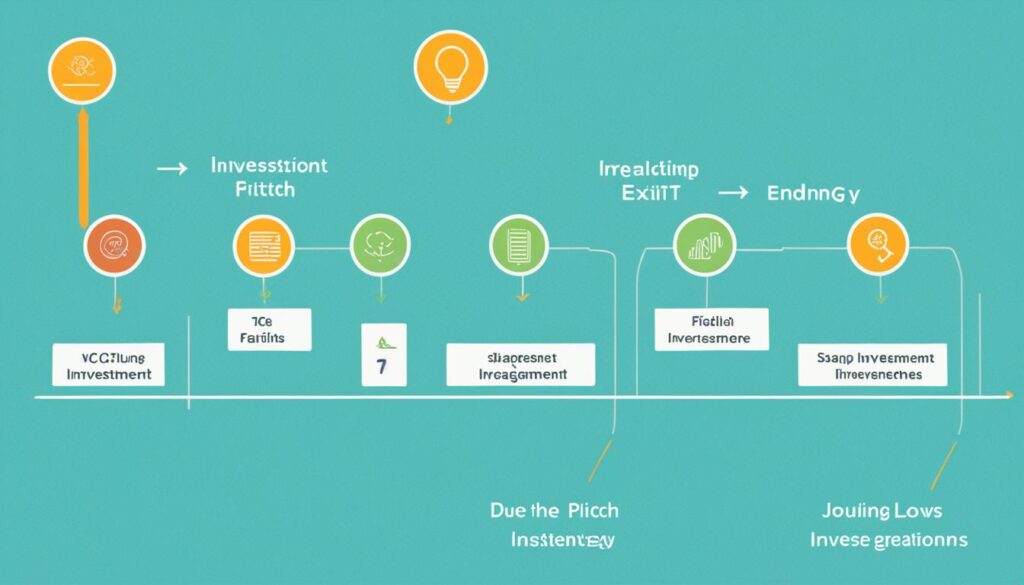The venture capital (VC) industry may seem like a glamorous and lucrative career path, but the reality is often quite different. While venture capitalists enjoy the prestige and potential rewards of backing the next big tech unicorn, the day-to-day work can be incredibly stressful and demanding. From the intense competition for the best deals to the uneven compensation structures, the venture capital lifestyle is not for the faint of heart. So, is working in VC really as stressful as it’s often portrayed? Let’s take a closer look at the realities of this high-stakes industry.
Key Takeaways
- The venture capital industry is highly competitive, with only a few new partner slots opening up each year even at the top firms.
- Venture capital work is primarily focused on returns and closing the most promising deals, with only the potential $1 billion+ “unicorn” startups truly moving the needle.
- It can take over 15 years to see real profits from VC investments, as funds must first pay back their own investors before sharing in the gains.
- Compensation structures in VC are often uneven, with managing partners taking a disproportionate share of the profits.
- The lack of true autonomy and team collaboration in VC firms can also contribute to stress and job dissatisfaction.
Understanding the Venture Capital Industry
The venture capital industry is a small, yet highly influential asset class, with most VC firms operating with a limited number of partners and additional investors. This tight-knit environment presents a unique challenge when it comes to venture capital partner promotion, as there are typically only a few new partner slots available each year, even at the largest and most prestigious firms.
Venture Capital: A Tiny but Influential Asset Class
Venture capital firms, unlike traditional corporate structures, often do not follow a standard partnership promotion model. The compact nature of these organizations means they generally do not need to continually add new partners, as the VC firm structures are designed to be streamlined and efficient. This has created a scenario where the venture capital industry overview is dominated by a select few well-established firms and their trusted investment teams.
Limited Partnership Structures and Promotion Paths
The limited promotion opportunities in venture capital can be a source of frustration for aspiring VCs, as the path to becoming a partner is often arduous and uncertain. Unlike other industries where the partnership ladder is more well-defined, the venture capital world operates with a more fluid and subjective approach to advancement. This can make it challenging for individuals to chart a clear career progression within the venture capital industry overview.

The Nature of Venture Capital Work
Venture capital work is primarily a sales and finance job, where returning strong results and closing the VC job responsibilities top deals are the key priorities. In the venture capital world, only the startups with the potential to become $1 billion+ “unicorns” truly move the needle for investors. Many amazing companies that don’t fit this narrow valuation criteria are often overlooked.
Hunting for Unicorns: The Quest for Billion-Dollar Startups
Venture capitalists are constantly on the hunt for the next billion dollar startup investments, scouring the market for the few startups that have the potential to achieve a $1 billion or more valuation. This relentless pursuit of “unicorns” is a driving force in the industry, as these high-growth, high-impact companies are the ones that can truly transform a VC fund’s portfolio and returns.
The Long Road to Profitability: 15+ Years of Investment Cycles
Additionally, it can take 15 years or more to see real profits from VC investment timeline VC investments, as funds must first pay back their own investors before sharing in the gains. This long-term investment horizon is a key characteristic of the venture capital industry, requiring patience and a long-term outlook from both investors and the startups they back.

Is working in VC stressful?
The venture capital (VC) industry is fiercely competitive, with the best startup deals attracting far more investor interest than available shares. Venture capitalists must constantly hustle and outmaneuver rivals to secure the most promising investments. This intense competition can undoubtedly contribute to the stress associated with a career in VC.
Fierce Competition for the Best Deals
VC firms are constantly vying for the attention of the most sought-after startups, leading to a high-pressure environment where competition for startup investments is fierce. Venture capitalists must be relentless in their pursuit of the top dealflow, networking tirelessly and executing flawless pitches to win the confidence of founders.
Uneven Compensation Structures and Carry Distribution
The venture capital compensation structures can also be uneven, with the “boss” or managing partners at a fund often taking a disproportionate share of the profits, known as “carry.” This can leave junior VCs feeling that their efforts are not being adequately rewarded, further contributing to the stress and pressure of the job.
| Venture Capital Stress Factors | Impact |
|---|---|
| Intense Competition for Deals | Venture capitalists must constantly hustle to secure the most promising investments, leading to high-pressure situations and long hours. |
| Uneven Compensation Structures | Junior VCs may feel their contributions are not being properly recognized or rewarded, causing frustration and discontent. |
| Limited Promotion Opportunities | With few new partner slots available, the path to advancement in VC firms is extremely narrow, adding to the stress and competition. |
| Pressure to Deliver Outsized Returns | Venture capitalists are under constant pressure to identify and back the next “unicorn” startup, further contributing to the high-stress nature of the job. |
While the venture capital lifestyle can be rewarding in many ways, the combination of fierce competition for startup investments, uneven venture capital compensation structures, and other industry-specific factors undoubtedly contribute to the overall stress that many professionals experience in this field.

The Downsides of VC Life
Despite the prestige and potential rewards associated with a venture capital (VC) career, there are significant downsides that aspiring VCs should consider. One of the primary challenges is the lack of autonomy and true leadership roles within VC firms. Typically, these firms are informally run by one or two dominant managing partners for decades, leaving junior VCs expected to simply execute the strategies set by these leaders with little say in the overall direction of the firm.
Furthermore, team collaboration is relatively weak in the VC world, with partners often working solo on their own deals rather than as a cohesive unit. This siloed approach can hinder the cross-pollination of ideas and the ability to leverage collective expertise. Many VC firms also struggle with institutional longevity, experiencing a high degree of turnover among non-managing partners, which can undermine the firm’s long-term stability and continuity.
| Downsides of Venture Capital Career | Impact |
|---|---|
| Lack of Autonomy and True Leadership Roles | Junior VCs expected to execute strategies set by managing partners, with little input on the firm’s direction |
| Weak Team Collaboration | Partners work independently on their own deals, limiting cross-pollination of ideas and collective expertise |
| High Turnover Among Non-Managing Partners | Undermines institutional longevity and continuity within VC firms |
Ultimately, the downsides of VC life, such as the lack of autonomy, weak collaboration, and high turnover, can make the venture capital career path less appealing for some individuals who may seek greater control, teamwork, and stability in their professional pursuits.

Surviving and Thriving in VC
To succeed in the highly competitive venture capital (VC) industry, VCs must develop a compelling investment thesis that sets them apart from their rivals. This involves identifying underserved market opportunities and articulating a clear vision for backing the most promising startups. By cultivating a robust professional network and demonstrating relentless hustle, VCs can secure the best deals before their competitors.
Building a Compelling Investment Thesis
Crafting a distinctive VC investment strategy is crucial for standing out in the crowded VC landscape. VCs must deeply understand emerging trends, technologies, and consumer behaviors to identify untapped market segments with significant growth potential. By developing a well-researched and thoughtfully-articulated investment thesis, VCs can convince founders and limited partners of their ability to identify and capitalize on the most promising investment opportunities.
Leveraging Your Network and Hustle
In venture capital, networking and hustle are essential for securing the best deals before competitors. Successful VCs maintain a robust and diverse professional network, cultivating relationships with founders, fellow investors, and industry experts. They must also demonstrate relentless drive, proactively reaching out to potential investment targets and being willing to go the extra mile to secure coveted deals. This combination of strong relationships and tireless effort is often the key to building a thriving VC portfolio.

Comparing VC to Entrepreneurship
While the venture capital (VC) lifestyle may appear easier than entrepreneurship at times, the reality is that being a VC can be just as challenging, if not more so in certain respects. Venture capitalists often lack the autonomy and true leadership roles that founders enjoy when starting a startup, and may earn less than the most successful startup CEOs despite their apparent perks.
The Rewards of Venture Capital vs. Founding a Startup
The rewards of each path ultimately depend on an individual’s priorities and tolerance for risk. For those drawn to the venture capital industry, the potential to shape the future of promising startups and earn a share of their success can be highly appealing. However, the lack of true decision-making power and potential for smaller financial returns compared to founding a high-growth startup may be a deterrent for some.
Ultimately, the choice between VC and entrepreneurship comes down to an individual’s career goals, risk tolerance, and personal values. Both paths offer unique rewards and challenges, and the right choice will depend on what an aspiring professional values most in their professional journey.

The Competitive Landscape
The venture capital industry is highly competitive, with a small number of established, branded firms dominating the VC competitive landscape. These top venture capital firms often enjoy significant brand recognition and resources, making it challenging for newer or lesser-known players to break into the elite circle.
Established Firms and Brand Recognition
The venture capital industry is characterized by a handful of well-known, established firms that have built strong reputations over decades of success. These top venture capital firms have access to extensive networks, deep pockets, and the trust of founders and limited partners. Breaking into this exclusive group can be an uphill battle for younger or less-renowned VCs looking to make their mark.
Differentiating Your Value Proposition
To stand out in the crowded VC competitive landscape, newer or lesser-known venture capitalists must work to build a compelling value proposition that attracts founders. This often involves developing specialized expertise in certain verticals or offering unique access to resources and networks that larger firms may not be able to match. By differentiating their approach and positioning themselves as experts in specific domains, VCs can better position themselves to secure high-quality investments and establish a strong reputation within the industry.
| Top Venture Capital Firms | Key Differentiators |
|---|---|
| Andreessen Horowitz | Extensive industry expertise, deep founder network, ability to recruit top talent |
| Sequoia Capital | Reputation for identifying and backing transformative technologies, long-term investing horizon |
| Kleiner Perkins | Diversified portfolio across sectors, focus on supporting women and minority founders |
| Accel Partners | Global reach, specialized teams for different verticals, strong international presence |
Ultimately, navigating the VC competitive landscape and how to stand out as a VC requires a combination of strategic positioning, specialized expertise, and a relentless commitment to building valuable relationships and networks within the industry.
Personal Considerations
Individuals considering a career in venture capital must carefully weigh their personal lifestyle preferences and long-term career aspirations. The work-life balance in VC can be demanding, with long hours and intense competition, leaving little time for other pursuits. However, the skills developed as a VC, such as investment analysis, dealmaking, and networking, can be highly transferable skills from VC to other finance and business roles, providing VC career path options down the line.
Balancing Lifestyle and Career Aspirations
The venture capital lifestyle can be demanding, with venture capitalists often working long hours and facing fierce competition to secure the best deals. This can leave little time for work-life balance, as the pressure to outperform rivals and deliver exceptional returns is constant. Individuals drawn to the prestige and potential rewards of VC must carefully consider whether the lifestyle aligns with their personal preferences and long-term career goals.
Transferable Skills and Career Mobility
One of the key benefits of pursuing a career in venture capital is the development of a diverse set of highly valuable skills. As a VC, individuals hone their abilities in areas such as investment analysis, dealmaking, and professional networking. These skills are often highly transferable to other finance and business roles, providing venture capitalists with increased career mobility and options should they decide to pursue a different path in the future.
| Venture Capital | Transferable Skills |
|---|---|
| Investment analysis | Financial modeling, market research, due diligence |
| Dealmaking | Negotiation, contract management, pitch presentation |
| Networking | Relationship building, business development, strategic partnerships |
By carefully considering their personal lifestyle preferences and the long-term career opportunities afforded by a VC career, individuals can make an informed decision about whether venture capital is the right path for them.

Conclusion
In conclusion, while a career in venture capital (VC) may appear alluring and prestigious, it is also fraught with significant challenges and stresses. The intense competition for the best deals, uneven compensation structures, and lack of true autonomy can make the VC lifestyle less glamorous than it may seem. Ultimately, the decision to pursue a VC career requires carefully weighing the pros and cons, as well as one’s own personal priorities and tolerance for the unique demands of the industry.
The venture capital landscape is highly competitive, with VCs being notoriously selective and often saying “no” as a professional disposition. Additionally, the likelihood of finding a “Partner track” role in VC is lower than many perceive, with most analyst and associate positions being two-year appointments. Furthermore, a significant percentage of inbound deal flow is considered not worth pursuing, emphasizing the importance of quality over quantity in investments.
While working in VC may provide access to prestigious deals and networks, it does not necessarily lead to substantial wealth creation, as many other fields can potentially be more lucrative. Additionally, the lack of upside potential for junior VCs, with 90% not receiving “carry,” can contribute to a lack of job satisfaction and long-term fulfillment. Ultimately, the decision to pursue a VC career requires a clear understanding of the industry’s pros and cons, as well as a strong alignment with one’s personal and professional goals.
FAQ
Is working in VC stressful?
What is the structure of the venture capital industry?
What are the key responsibilities of a venture capitalist?
FAQ
Is working in VC stressful?
While the venture capital (VC) lifestyle may appear glamorous, the reality is that being a VC can be just as challenging, if not more so in certain respects. The VC industry is highly competitive, with fierce competition for the best deals, uneven compensation structures, and a lack of true autonomy, which can make the job quite stressful.
What is the structure of the venture capital industry?
Venture capital is a tiny asset class, with most VC firms having just a handful of partners and additional investors. There are very limited promotion paths in venture capital, with only a few new partner slots opening up each year even at the largest and top-tier firms.
What are the key responsibilities of a venture capitalist?
Venture capital work is primarily a sales and finance job, where returning strong results and closing the top deals are the key priorities. In the venture capital world, only the startups with the potential to become
FAQ
Is working in VC stressful?
While the venture capital (VC) lifestyle may appear glamorous, the reality is that being a VC can be just as challenging, if not more so in certain respects. The VC industry is highly competitive, with fierce competition for the best deals, uneven compensation structures, and a lack of true autonomy, which can make the job quite stressful.
What is the structure of the venture capital industry?
Venture capital is a tiny asset class, with most VC firms having just a handful of partners and additional investors. There are very limited promotion paths in venture capital, with only a few new partner slots opening up each year even at the largest and top-tier firms.
What are the key responsibilities of a venture capitalist?
Venture capital work is primarily a sales and finance job, where returning strong results and closing the top deals are the key priorities. In the venture capital world, only the startups with the potential to become $1 billion+ “unicorns” truly move the needle for investors, leaving many amazing companies overlooked.
What are the challenges of working in venture capital?
The venture capital industry is fiercely competitive, with the best startup deals attracting far more investor interest than available shares. Venture capitalists must constantly hustle and outmaneuver rivals to secure the most promising investments. The compensation structures in VC can also be uneven, with the “boss” or managing partners at a fund often taking a disproportionate share of the profits.
What are the downsides of the venture capital lifestyle?
Venture capitalists often lack the autonomy and true leadership roles that founders enjoy, and may earn less than the most successful startup CEOs despite their apparent perks. The industry also struggles with institutional longevity, with a high degree of turnover among non-managing partners.
How can one succeed in the venture capital industry?
To survive and thrive in the highly competitive venture capital industry, VCs must develop a compelling investment thesis that sets them apart from rivals. This involves identifying underserved market opportunities and being able to articulate a clear vision for backing the most promising startups. Cultivating a robust professional network and demonstrating relentless hustle are also crucial for securing the best deals before competitors.
How does working in venture capital compare to entrepreneurship?
While the venture capital lifestyle may appear easier than entrepreneurship at times, the reality is that being a VC can be just as challenging, if not more so in certain respects. Venture capitalists often lack the autonomy and true leadership roles that founders enjoy, and may earn less than the most successful startup CEOs despite their apparent perks.
How competitive is the venture capital industry?
The venture capital industry is highly competitive, with a small number of established, branded firms dominating the space. Breaking into this elite group or differentiating one’s firm can be extremely difficult. Newer or lesser-known VCs must work to build a compelling value proposition that attracts founders, often by developing specialized expertise in certain verticals or offering unique access to resources and networks.
What personal considerations should one make when pursuing a career in venture capital?
Individuals considering a career in venture capital must carefully weigh their personal lifestyle preferences and long-term career aspirations. The venture capital lifestyle can be demanding, with long hours and intense competition, leaving little time for work-life balance. However, the skills developed as a VC, such as investment analysis, dealmaking, and networking, can be highly transferable to other finance and business roles, providing career mobility options down the line.
billion+ “unicorns” truly move the needle for investors, leaving many amazing companies overlooked.
What are the challenges of working in venture capital?
The venture capital industry is fiercely competitive, with the best startup deals attracting far more investor interest than available shares. Venture capitalists must constantly hustle and outmaneuver rivals to secure the most promising investments. The compensation structures in VC can also be uneven, with the “boss” or managing partners at a fund often taking a disproportionate share of the profits.
What are the downsides of the venture capital lifestyle?
Venture capitalists often lack the autonomy and true leadership roles that founders enjoy, and may earn less than the most successful startup CEOs despite their apparent perks. The industry also struggles with institutional longevity, with a high degree of turnover among non-managing partners.
How can one succeed in the venture capital industry?
To survive and thrive in the highly competitive venture capital industry, VCs must develop a compelling investment thesis that sets them apart from rivals. This involves identifying underserved market opportunities and being able to articulate a clear vision for backing the most promising startups. Cultivating a robust professional network and demonstrating relentless hustle are also crucial for securing the best deals before competitors.
How does working in venture capital compare to entrepreneurship?
While the venture capital lifestyle may appear easier than entrepreneurship at times, the reality is that being a VC can be just as challenging, if not more so in certain respects. Venture capitalists often lack the autonomy and true leadership roles that founders enjoy, and may earn less than the most successful startup CEOs despite their apparent perks.
How competitive is the venture capital industry?
The venture capital industry is highly competitive, with a small number of established, branded firms dominating the space. Breaking into this elite group or differentiating one’s firm can be extremely difficult. Newer or lesser-known VCs must work to build a compelling value proposition that attracts founders, often by developing specialized expertise in certain verticals or offering unique access to resources and networks.
What personal considerations should one make when pursuing a career in venture capital?
Individuals considering a career in venture capital must carefully weigh their personal lifestyle preferences and long-term career aspirations. The venture capital lifestyle can be demanding, with long hours and intense competition, leaving little time for work-life balance. However, the skills developed as a VC, such as investment analysis, dealmaking, and networking, can be highly transferable to other finance and business roles, providing career mobility options down the line.
